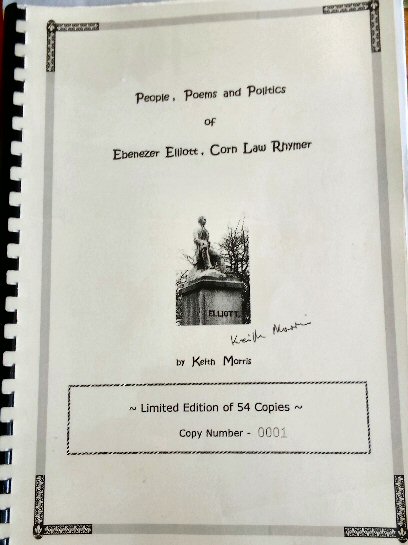

Introduction
People, poems and politics of ebenezer Elliott, corn law rhymer

From
humble beginnings in
The
writer’s earlier book, “Ebenezer Elliott: Corn Law Rhymer and Poet of the
Poor,” was very much an introductory work, concentrating on the basic biography
with a survey of the Rhymer’s verse penned by Ray Hearne. “People, Poems and
Politics of Ebenezer Elliott, the Corn Law Rhymer” is a much different book; it
takes a deeper look at various elements in the poet’s story and makes a good
number of new discoveries about Elliott & his activities.
“People,
Poems and Politics of Ebenezer Elliott, the Corn Law Rhymer” does what you
might expect with such a title. It looks at the poet’s relationships with
several personalities who were important to the bard; it examines the famous
“Corn Law Rhymes,” it even discovers some unpublished poems by Elliott and it
probes his politics, particularly in the early years of the Chartist Movement
when the Corn Law Rhymer took a more central role on the national stage than had
been understood previously. Behind the title lie two further levels which make
the volume more useful to the serious reader. In the first place, the book is a
very good resource on Elliott since it includes the most detailed chronology
ever published of the poet’s life and work. Added to this are a useful reading
list and Elliott’s important Preface to the “Corn Law Rhymes.” The Preface has
only rarely been printed anywhere, yet it gives real insight into the poet’s
motivation at a critical point in his career. The Preface is fairly long (which
explains why the piece has not often seen publication) but it is worth a
careful read since Elliott’s truculent character inexorably takes centre stage.
The
book can also be viewed as a sort of biography since it begins with an
autobiographical fragment written in 1841. The fragment has been mined by every
commentator for biographical information, but the complete text, as printed in
this study of Elliott, has not appeared in any of the books written about the
poet. As the fragment deals only with the early years, it has been supplemented
by two further articles which help the reader to form a complete picture of the
Poet of the Poor. One is a major article which appeared in the
The
research findings described in this book show the poet in a different light to
earlier studies which perhaps judged Elliott too much by his poetry. Today we
are inclined to give greater weight to his other achievements, while still
appreciating his verse – though not all of it! Elliott called himself “the Bard
of Free Trade,” and it has been accepted for a long time that he was effective
in bringing an end to restrictive trade practices such as the Corn Laws. What
has been largely missed is that Elliott was not an influential member of
parliament, he was not a powerful landlord: he was a man of the people, an
ordinary man who cared enough to stand up and spout. At considerable risk. This
took great determination and courage for a man in his position.
In
another sense Elliott was a modern man well ahead of his time. His concern for
working conditions, his wish to improve himself and his fellow men are today
better appreciated. He was, despite what many people believed, a man of peace. “I
would not hurt a fly, not even if it stung me” he once remarked, and he styled
himself “the Bard of Universal Peace.” These beliefs are those of a character
who would not be misplaced in society today. The poet’s impressive concern for
the educational welfare of local working people is demonstrated through his
dedication to the Mechanics’ Institute as described in a section of this book.
This is another thoroughly modern attitude; so, too, is the bard’s struggle to
educate himself – something usually described today as Lifelong Learning.
Given
that Elliott was a dunce at school, it was a major achievement to become a
political leader & a celebrated poet who was even read in
Then let me write for
immortality
One honest song, uncramp’d by forms or
creeds,
That men unborn may read my times and me,
Taught by my living
words, when I shall cease to be.
His
“honest song” is worth studying for there are certainly quality poems in the
poet’s work. It is good news that a university professor is preparing a new
edition of Elliott’s poems for publication. This will help the revival of
interest in Elliott’s poems & in the political activity of a remarkable man
whose character was “uncramp’d by forms or creeds.”
Many
newly discovered letters by Elliott appear in this volume, including those he
wrote to Robert Southey and one he wrote to William Wordsworth. Also to be
found in the book are several letters written by James Montgomery, the
“People,
Poems and Politics of Ebenezer Elliott, the Corn Law Rhymer” details much new information
about the Poet of the Poor &
portrays him as a positive force in the cultural & political development of
Sheffield; in this sense it adjusts the balance in the poet’s favour after
years of neglect and negative commentaries.
Keith
Morris
Rotherham
2005
“Ebenezer
Elliott: Corn Law Rhymer & Poet of the Poor” (joint author with
Ray Hearne), Rotherwood Press 2002, ISBN 0 903666 95 2
“Wassop Worksop” published by the author, 2000.
“I Were A Worksop Lad” published by the author, 1998
“Pawnshop on Monday: Sheffield Folk Remember” (consultant editor), Hallamshire Press 1994
Click the Anvil to return to the Ebenezer Research Foundry 